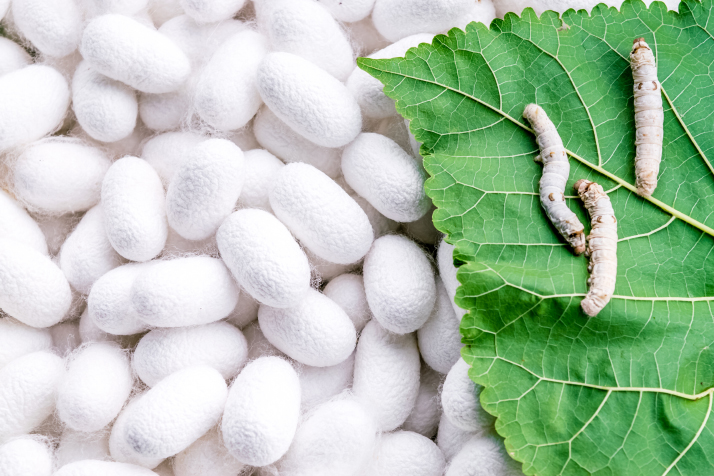Let’s talk Sericulture
June 3, 2021Museveni To Deliver State Of Nation Address on June 4
June 4, 2021Gregory Owor, 39, has seen his life take an upward trajectory since he was introduced to a lucrative mulberry project in his district of Iganga in central Uganda.
Owor was battling to make ends meet in his shack before learning about the project and not optimistic about his family’s future.
“I can now afford to look after my family adequately. With money I got from selling mulberry leaves, I managed to construct a permanent house and can also afford to send my children to school,” said Owor.
The project Owor speaks about is part of a massive silk production drive in Uganda brought about through cooperation with China, a part of initiatives to develop the country’s economy and provide employment, especially to the youth.
The two countries are working with NGOs, formal business, entrepreneurs and individuals to encourage Ugandans to embrace sericulture (the cultivation of silkworms to produce silk). Sericulture includes everything from breeding and maintenance of silkworms and mulberry tree cultivation to testing of raw silk quality, silk thread and fabric production. Each phase of the process involves many people, hence the employment benefits. All necessary arrangements are being made to ensure that the supply of silkworm cocoons, from which silk fiber and clothes are made, will in the near future be sustainable.
Owor’s change of fortune stems from mulberry tree leaves being the staple food of silkworms and therefore an essential cog in the sericulture wheel.
Chinese expertise
Seres Textile Co. Ltd., the Chinese enterprise helping Uganda to advance its silk production, is based in Kireka, about 10 km from Uganda’s capital Kampala. Li Chao, Seres Chief Executive Director, employs a staff of 45 local people and six Chinese sericulture experts. Li and his staff have made great strides in promoting sericulture in the East African country.
Seres Assistant Manager Aggrey Waiswa said that because silk is an expensive product, the company wants as many Ugandans as possible to benefit from sericulture.
According to him, Seres was founded in 2017 “to empower sericulture projects in Uganda and improve lives of Ugandans,” said Waiswa.
He said that sericulture is a complex process because much of the work requires experience. The six Chinese sericulture experts at Seres have helped train an increasing number of Ugandans, leading to more locals getting involved in silk-related activities, said Waiswa.
“They [the experts] go into the fields on farms to show Ugandans how to grow mulberry trees. They also guide Ugandans on how to look after the silkworms,” said Waiswa. Seres buys the mulberry leaves back from the farmers once the trees are matured.
He said that apart from teaching local people the finer points of sericulture, Seres also provides farmers with free silkworms eggs, mulberry seedlings and other necessary materials.
“We have about 4000 workers and we will employ more when we get the modern machines that make silk fabric”.
Currently, TRIDI stocks large numbers of cocoons from which they will start making silk fabrics. said they have already been processing cocoons in Sheema, which have tested in the good quality range.

Flourishing industry
In the last five years, the Ugandan Government has invested a lot of money into the sericulture project, with about 10,000 people already employed both as skilled and casual workers. The government has been cooperating with Chinese sericulture experts in the country.
In 2020, Uganda expanded its silk production with a $100-million investment. This year, the government has invested about $150 million in sericulture.
A government report said that it had established that there was a higher-than-expected global demand for silk and that a feasibility study by the government found that commercial silk production can spur job creation and improve household incomes.
The country’s major local sericulture organization is the Tropical Institute of Development Innovations (TRIDI). Its principal investigator Clet Masiga said that Ugandans should seize the sericulture opportunity to create rural and urban employment and economic growth.
Apart from being in partnership with China, TRIDI is supported by Uganda’s Ministry of Science, Technology and Innovations, and supervised by the Uganda National Council for Science and Technology.
Masiga said that the partnership between his organization and China has led to the silk industry flourishing in the country.
According to Masiga, Seres supported them in setting up silkworm-rearing houses, provided necessary technologies for rearing silkworms and also bought the cocoons.
At the rate at which sericulture is growing in Uganda, in five years, Uganda will be the leading producer of silk in Africa and among the best five in the world after China and India, said Masiga.
He said that TRIDI is encouraging and training local people to start growing mulberry trees as one of the ways of fighting poverty and improving their domestic income. It has established huge mulberry farms in over 20 districts in the country because it plans to start massive production of silk fiber and clothes to be exported to China. The districts where the farms are established include Mubende, Iganga, Zombo, Mukono, Nakaseke, Kitigum and Nwoya.
“Every month, Uganda exports at least 2 tons of silk cocoons to China; but soon the amount will increase and the export will also include silk threads and fiber,” said Senior Research Officer at TRIDI Sarah Babirye.
She said that apart from being easy to grow and nurture, money earned from selling mulberry leaves or culturing cocoons is far more than that from selling coffee and cotton, traditional crops in Uganda. Babirye said that a kg of cotton is sold at 1,500 shillings ($0.40), coffee at 3,000 shillings ($0.80), while the price of silk cocoons is 15,000 shillings ($4.10) per kg.

Grassroots support
Traditional or cultural leaders, who are much respected by Ugandans, have also become interested in the silk project. Alur Kingdom in north Uganda has offered TRIDI thousands of acres of land to grow mulberry trees. Alur Kingdom Prime Minister Vincent Ocaya said, “The Alur Kingdom urges people in the kingdom, and Uganda at large, to embrace the silk project because it is viable and will go a long way in improving their lives.”
TRIDI spokesperson Ritah Elite said the machines for the silk factory which they are constructing were already bought and paid for in China; but they have been delayed in shipping for three months due to the COVID-19 pandemic, adding that they were looking for more investors in the project.
Uganda’s Minister of Agriculture, Animal Industry and Fisheries Vincent Ssempijja said, “We have welcomed the initiative. Sericulture is opening the eyes of Ugandan farmers and a good number are taking it on.”
Research carried out by agricultural experts in Uganda has indicated that silk farming is an eco-friendly, agro-based venture. It has the potential for environmental amelioration, employment and income generation. CA

